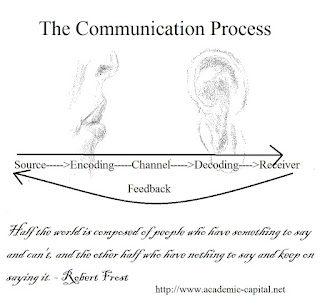What did you say? Today is the
time of massive communication that spans the globe over. From presenting a
concept to stakeholders to sending an email the ability to communicate
effectively in business makes a huge difference in the successful completion of
goals. To write and speak clearly is to use the medium of thought transference effectively
so as to ensure that others both understand and process messages accurately.
Such important communication concepts are becoming more important as business
school graduates seek ways of influencing their environment and gain
recognition.
Business schools are an important
avenue of learning about communication and how to effectively communicate
important concepts and principles. The majority of business communication
courses were taught by the business department versus other departments (Wardrope
and Bayless, 1999). It is through this content that students can learn about
how, when and where to effectively communicate in the modern business context.
Times have changed. A hundred
years ago people spoke face-to-face and didn’t move far away from their social
networks. Once the telephone was offered on every desk it became easier to pick
up the phone and call upstairs than to trek the staircase. Soon after email was
introduced in the market transference of information grew at unprecedented
rates. In today’s world we are using videos, text, and streaming to communicate.
Such changes are forcing colleges to adjust the way they teach communication
and the classes they offer.
Even if the medium has changed
the essential elements of communication have not. A thought leads to images or
pictures that are then transferred through some medium and these are decoded by
the receiver who makes meaning out of the information. The
sender-medium-receiver sequence stays the same regardless of the medium that is
employed. As technology becomes more sophisticated, so does the amount of
information transference and the vividness of the messages.
Helping students understand how
to write and speak well is important for their career success. Likewise, it is
important to help such students use communication principles and adapt them to
modern communication mediums. Through effectively communication methodology
such students can better influence their environment and improve upon the
innovative abilities of their organizations. Research helps highlight how
business communication courses are becoming more important at the top 50
business schools.
The study by Sharp and Broomberger (2013) was
conducted as a repeat of Knights (1999) research on the business communication
offerings of the top 50 undergraduate business schools. The study only used
those courses that were listed as communication courses within business
schools. All of the schools are AACSB accredited and maintained comprehensive
websites and information. The schools were chosen because they were listed in
Bloomberg Business rankings for 2011 (Bloomberg, 2011).
Results:
-102 business communication courses at 42 schools.
-7 schools did not mention any communication
courses.
-For the 42 total schools that offered business
communication courses 32 schools offered such courses within the business
department when compared to English departments, media, etc…
-Out of the 102 business communication courses 76%
were within the business department which indicates an increase from 69% found
in Knight’s study.
-Out of the 42 schools that offered business
communication 10 did not anchor their classes to a particular content area.
-27% of business communication courses offered was
lower level courses.
-73% of business communication courses were upper
division.
-Of the 44 courses required for a degree 29 were
part of the business department.
-Out of 44 courses required 32 were optional and
could be swapped out.
-Written and oral communication took precedence.
Analysis:
There was not much change between Knight’s 1999
study and Sharp and Broomberger’s 2013 study. Smaller changes were associated
with an increase in business communication as part of curriculum. Some of the
schools may have been inadvertently requiring duplication of similar content
through different courses hosted in different departments. Greater preference
appears to be on written communication which is growing in the Internet age as
well as verbal communication needed to effectively work with others.
Sharp, M. & Brumberger, E. (2013). Business
communication curricula today: revisiting the top 50 undergraduate business
schools. Business Communication
Quarterly, 76 (1).
Wardrope, W. J., & Bayless,
M. L. (1999). Content of the business communication course: An analysis of
coverage. Business Communication Quarterly, 62(1), 33-40.

